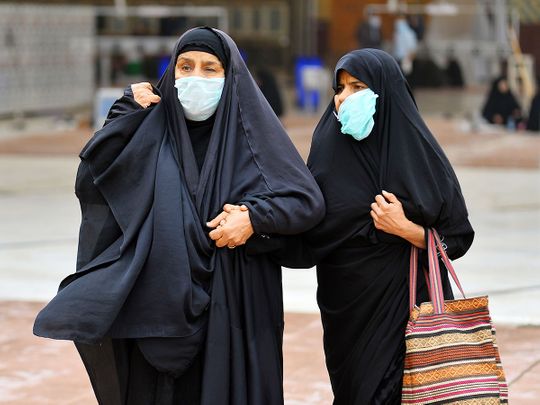
Najaf: The doctor paused before banging on the front gate, gesturing to his companions who were wearing full hazmat suits, masks, goggles and gloves to stand back so they would not be the first thing the home’s occupants saw.
“This is very sensitive, very difficult for our society,” said Dr Wissam Cona, who works with the provincial health department in the city of Najaf in southern Iraq. He now spends his days checking on families recently returned from Iran, which has suffered one of the world’s most severe outbreaks of the coronavirus.
He said that the father of the family at this home had begged him not to come with a retinue of health workers, saying, “‘Please don’t park in front of our house. I feel ashamed in front of the neighbours. This is so difficult for my reputation.’”
For Iraq, one of the biggest obstacles for public health officials fighting the coronavirus is the stigma associated with illness and quarantine. It runs so deep that people avoid being tested, prevent family members who want tests from having them and delay seeking medical help until they are catastrophically ill.
The aversion to quarantine and the reluctance to admit illness may help explain why the number of confirmed cases in Iraq is relatively low, several Iraqi doctors said. A country of more than 38 million people, Iraq had recorded only 1,352 confirmed COVID-19 cases as of Monday.
Historical experience
The stigma attached to illness and quarantine in Iraq and some other Middle Eastern countries largely reflects cultural and religious beliefs. But it also involves an ingrained distrust of the government, historical experience and the fear that given the ragged state of Iraq’s health care system, going to the hospital could be fatal.
A recent video that was widely shared showed women patients in quarantine in a Basra hospital lying near each other without masks, coughing and calling for help as one of them died.
“Some believe the virus means that God is displeased with them, or maybe it is a punishment for a sin so they don’t want others to see that they are sick,” said Dr Emad Abdul Razzak, a consultant psychiatrist at Iraq’s Health Ministry.
“For many people it is a shame for a female to say she has this illness or any illness, even cancer or mental illness, and many people have no trust in the health system,” he said.
Islamic tradition
So strong are the stigma and the aura of sinfulness surrounding the virus that families of those who have died of other causes oppose their loved ones’ bodies being in the same morgue or even graveyard as those who have died of the virus.
The Islamic tradition requires swift burial, preferably within 24 hours of death. The longer the delay, the more people fear for the soul of the deceased.
Adding to the problems is the tradition of washing the bodies of people who have just died, which the authorities fear could spread the virus.
Quarantining those who are infected imposes a double humiliation in many Iraqi communities. First, it assures that everyone in the neighbourhood will learn about the illness. Second, if the victim is an adult male, it signifies that he is no longer able to protect his wife, his children or in the case of an elder brother, his younger siblings, and so has fallen short of fulfilling his role in the family.
More traditional families sometimes deny their female relatives a coronavirus test for fear that if she tests positive she will be removed from the fortress of her family and possibly be sexually compromised.
“In this society, it is not OK for a female to be apart from the family,” said Dr Mona Al Khafaji, a radiologist in private practice in Baghdad.
She mentioned the case of a 32-year-old female patient with fibrosis, which heightens her vulnerability to the coronavirus, who was having trouble breathing. Al Khafaji recommended the woman go for a Covid-19 test, but her father and brothers said no, and refused to budge even when her condition worsened.
Lately, in an effort to overcome the stigma and put together an accurate picture of the scope of the epidemic, the Iraqi Health Ministry has resorted to random testing. But this programme has brought a new set of troubles.
Violent past
For one thing, some healthy people could be falsely stigmatised. And to display its resolve, the government has assigned armed national security personnel to accompany health workers. Given Iraq’s violent past, the presence of security forces is so unnerving it makes some people hide in their homes.
“It is so difficult in this culture because everything we do is a problem,” said Dr Mohammad Waheeb, a senior pulmonologist at Baghdad Medical City. “If we send an ambulance to pick up the patient, then people are upset because the neighbours will see it.”
“The same happens or worse if we send the national security,” he added. “Then people feel it is like under Saddam,” he said, referring to Iraq’s former strongman president, Saddam Hussein.








